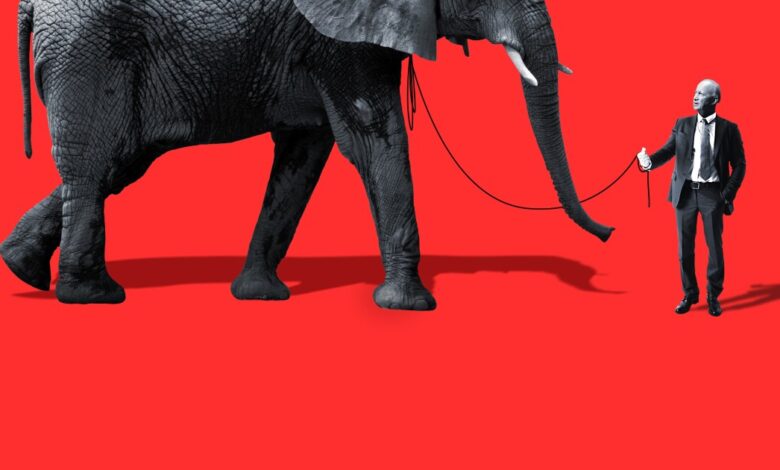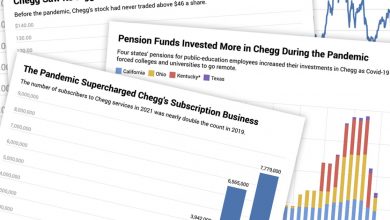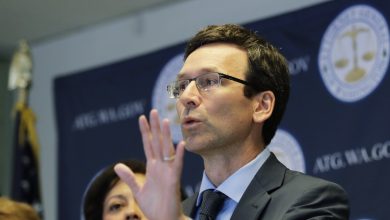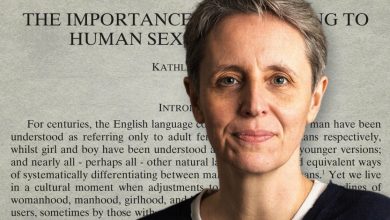How Mitch Daniels Made Purdue a University Conservatives Can Love

[ad_1]
The conservative bill of indictment against higher education is longstanding and, according to public-opinion surveys, gaining in adherents.
But there’s one man many conservative critics of higher ed have learned to love: Mitchell E. Daniels Jr., who led Purdue University for a decade, stepping down as president at the end of last year. They laud his focus on freezing tuition and providing affordable degrees in valuable STEM subjects, as well as his decision to adopt a campus-speech policy that encourages “free, robust, and uninhibited debate and deliberation among all members of the University’s community.”
“As a general matter, if more universities operated the way Purdue has operated, satisfaction would be much higher,” said Lindsay Burke, director of the Center for Education Policy at the conservative Heritage Foundation.
At a moment when higher education is under constant fire from partisan detractors and the college degree has itself become a central dividing line in American politics, is Daniels’s tenure at Purdue a model for how to effectively lead a public university through fraught times? And is Daniels, a former Republican governor of Indiana, an antidote to growing conservative disfavor of higher education?
Sitting in his office wearing a Purdue-themed, plaid button-down, Daniels insisted that he had eschewed partisan political activity while leading Purdue, and that his intent had never been to prescribe policies to other institutions. “I never used the ‘C’ or ‘L’ word, almost never the ‘R’ or ‘D’ word,” he said during an interview in early December at Purdue’s main administrative building, “but, you know, I was always trying to emphasize bringing people together.”
That’s not to say he would mind if other universities followed his model. “Could Purdue serve as some sort of a corrective or a counterexample? I’d be very proud if that happened,” Daniels said. “I’m a big believer in higher education and its importance to the country and the importance that we maintain the best network of institutions in the world. And that’s exactly why I think its shortcomings are worth worrying about trying to improve.”
He changed Purdue, but I’m not convinced he changed the university presidency as a job.
Even his critics acknowledge that Daniels has been a significant president — his name is often mentioned alongside reformers like Michael Crow at Arizona State University. But they also point out that what works for a major research university wouldn’t work at most other colleges, which have more limited resources. On Purdue’s West Lafayette campus, Daniels is not immune from criticism. He is accused of shortchanging faculty pay and benefits to freeze tuition and allowing hate speech to flourish in the name of free expression. Some of Daniels’s efforts to make the university more entrepreneurial have also fallen short.
“He’s a former governor, he knows how to get things done,” said Barrett Taylor, an associate professor of higher education at the University of North Texas. “He changed Purdue, but I’m not convinced he changed the university presidency as a job.”
Polls show deep and growing discontent about college among conservatives across the country. In 2019, the Pew Research Center found that nearly 60 percent of those who identified as Republican thought colleges had a negative effect on the nation. By 2021 that figure had increased to 64 percent.
Polling from Pew has also found that conservatives overwhelmingly believe professors bring their liberal political and social views into the classroom. State legislatures have passed laws to restrict how race and racism are taught, and to limit how institutions train employees on those topics.
As a candidate, Donald J. Trump dragged higher education onto the front lines of the culture wars, painting colleges as bastions of progressive groupthink hostile to conservative viewpoints. Trump also rolled back protections for LGBTQ students and, in 2019, signed an executive order requiring federal agencies to ensure that institutions receiving federal research grants were properly protecting free inquiry. At the signing ceremony, Trump introduced several college students who alleged that they had been punished for their political views.
The partisan divide on higher education is also reflected in voters’ college attainment. Nearly 60 percent of those with a college degree now identify as or lean Democratic, according to the Pew Research Center, and those without a college degree are flocking to the Republican Party.
One thing that’s totally alienated a lot of people to many higher-ed institutions is the enforced conformity of thought; the uniformity of thought.
So far, no laws restricting instruction on “divisive topics” such as race, gender, and sexuality have been passed in Indiana, though several were proposed, according to the free-expression advocacy group PEN America, which tracks such legislation. Nationwide, nearly 20 such measures were signed into law since 2021, including bills in at least 10 states that apply to public colleges.
In an interview, Daniels lamented the overall souring public perception of higher education. “We can’t be happy that people have become dismissive about the whole enterprise,” he said, “or decided that it can’t possibly be worth either the money or the time.” He added that he understands the frustrations of those who argue that campuses are not welcome to a range of political viewpoints. “One thing that’s totally alienated a lot of people to many higher-ed institutions,” he said, “is the enforced conformity of thought; the uniformity of thought.”
On some issues, Daniels is willing to take a strong stand. Republican officials have attacked President Biden’s executive action to cancel up to $20,000 in federal student loans as an unconstitutional giveaway to the wealthy and an affront to those who have already paid off their education debts. The U.S. Supreme Court is scheduled to hear arguments in February from six Republican-led states, though not Indiana, that sued to stop the loan-forgiveness plan. In an interview with Fox News, Daniels called the executive order “grossly unfair to those who lived up to their responsibilities or never went to college at all. It’s grotesquely expensive and will aggravate our already terrifying national debt picture.”
Speaking out forcefully on political issues is something few university presidents are willing to do, even on matters that could affect their campuses. A Chronicle survey found that presidents almost invariably self-censor to avoid controversy and political backlash. As a result, they increasingly find themselves caught in the middle of contentious debates on social issues, weighing the relative risks or rewards of taking a public position.
Daniels, on the other hand, has a regular column in The Washington Post in which he airs his views on a wide variety of topics: meddlesome mothers who interfere too much in their children’s college experience, a California law meant to prohibit inhumane conditions on hog farms, and the necessity of reopening Purdue’s campus in the fall of 2020 despite the risks of Covid-19.
Daniels’s willingness to speak out, including to publicly critique higher education, is one of the things that have made Republicans look favorably on Purdue, said Andrew Gillen, a senior policy analyst at the right-leaning Texas Public Policy Foundation. “Having him in leadership, not afraid to put his views out there,” Gillen said, “gave them a reason to trust that if something was wrong, he would tell them.”
Daniels downplays his role as a conservative voice, and in many ways his style of politics is out of step with a party that still largely embraces Trump. Instead, Daniels said that he believes in “politics by addition, not division,” and that making college more welcoming to conservatives, generally, could be one way to stave off enrollment declines.
“Higher education will be better off if more people, you can call them conservatives, start to feel more confidence in it.”
The skills of a politician can be advantageous for a college president, particularly if that person is good at raising money and enjoys everyday interactions with people. “I sort of brought an affinity for that kind of thing from my last job,” Daniels said. “I always tell people, You know, you’ve got to find a way to stay in touch with the ground level.”
Higher education will be better off if more people, you can call them conservatives, start to feel more confidence in it.
For much of his career, however, Daniels served at the highest levels of both government and corporate leadership. He has a bachelor’s degree from Princeton and a law degree from Georgetown, and he began his political career working for Sen. Richard Lugar, Republican of Indiana. Daniels then ran the National Republican Senatorial Committee and became a top political adviser to President Ronald Reagan.
In 1987, Daniels left the White House to lead the conservative-leaning Hudson Institute and three years later became a senior executive for a pharmaceutical company. Daniels served as President George W. Bush’s budget director from 2001 to 2003.
He twice won Indiana’s governorship, in 2004 and again in 2008. At the end of his second term, he briefly considered entering the 2012 presidential race. Instead, another opportunity presented itself: the presidency of Purdue University, where Daniels as governor had appointed or reappointed all 10 members of the Board of Trustees.
Daniels said he was attracted to Purdue because of the opportunity to harness the university’s already strong offerings in science and engineering to generate economic activity for the region. “Anybody can see that in today’s economy, R1s, especially STEM-centric universities, are one of the great assets you can have.”
When he arrived at Purdue, about 45 percent of undergraduates were getting degrees in STEM. That figure has now increased to nearly 70 percent, and for a student body that is about 30 percent larger. In addition, several major corporations have begun to build research and manufacturing facilities near the campus, including Rolls-Royce and Saab, which are partnering with the university’s aerospace engineers. A $1.8-billion semiconductor plant is also in the works.
With the help of the university’s research foundation, housing is being built in West Lafayette for employees of those companies and others to bolster the population and economy in a rural area that might not otherwise attract large industries.
Purdue has also sought to expand its brand nationally. In 2017 the university acquired the for-profit Kaplan University to create the nonprofit online Purdue University Global. But the arrangement has been plagued by concerns that it was too opaque, would dilute the university’s reputation for rigor, and become a drain on its finances. The enterprise did not break even financially until a year ago, according to an analysis by Phil Hill, an education-technology consultant.
The goal of that arrangement, and the focus on affordability, Daniels said, is to uphold Purdue as a steppingstone for students from various backgrounds to improve their lives.
“This is the place where people from the farms, the small towns, the inner cities, you know, have come to a public university,” Daniels said,” and I’ve heard it countless times from people like that: ‘If not for Purdue,’ ‘it started at Purdue,’ ‘I owe it to Purdue.’”
The tuition freeze and Daniels’s other efforts to control costs are a big reason that Nadra Dunston, a sophomore studying mechanical engineering, admires Daniels. “He’s trying to utilize resources to make it affordable,” said Dunston, who is from West Lafayette, Ind.
What has made that tuition freeze possible is a large increase in enrollment. In addition to overall growth of nearly 30 percent over the past decade, the number of undergraduates from outside Indiana, who pay tuition of up to $29,000, has more than doubled during Daniels’s tenure. (Nonresident tuition has also remained the same since 2013.) Daniels points out that the number of students from Indiana has also increased, though it has fallen from 49 percent of the student body to 40 percent since he became president.
Freezing tuition isn’t unique to Purdue. In this case, the policy underscores Daniels’s background as a politician, noted Rebecca S. Natow, an assistant professor of educational leadership and policy at Hofstra University. “Tuition freezes are politically popular — they’re popular with students and families, and they’re popular with a lot of voters,” she said. But because of that popularity, they can be hard to undo even when they are no longer financially beneficial.
What Daniels did was really good for Purdue but really bad for Indiana.
Moreover, the kinds of policies that made Daniels a successful governor don’t necessarily work in higher education, said Michael J. Hicks, a professor of economics and director of a center for business research at Ball State University, in Muncie, Ind. He pointed to one of Daniels’s chief accomplishments as governor: overhauling the state’s bureau of motor vehicles.
Educating college students isn’t as simple as renewing a driver’s license or registering a vehicle — basic transactions that can often be completed in a few hours or less, said Hicks, who is also on the board of scholars at the Mackinac Center for Public Policy, which advocates for free-market reforms. “Education would be nice if you could make it more efficient, but the challenge of getting a higher number of people educated isn’t transactional.”
The real knock on the tuition freeze is that the university has become less accessible to low-income students. In an analysis of college-going rates in Indiana, Hicks found that the net price students were paying had increased at Purdue by nearly $1,200 between 2018 and 2020, but had fallen at the other four large public universities in the state. The reason for that increase is that Purdue is recruiting more affluent and nonresident students who pay the full sticker price of tuition, Hicks argues.
The freeze has undermined outcomes that Daniels argued for as governor, said Hicks, including seeking to improve the share of state residents with a college degree. Since 2015, the college-going rate in Indiana has declined from 65 percent of high-school graduates to 53 percent in 2020, according to Hicks’s analysis. That decline — 12 percentage points — is double the national average, Hicks found.
“What Daniels did was really good for Purdue,” Hicks said, “but really bad for Indiana.”
Another free-market idea meant to reduce the burden of federal student loans was Purdue’s income-share agreements, which offered students money for college. In return, students agreed to repay a share of their income to private investors after graduating and getting a job.
Over seven years, the program provided about $21 million to roughly 1,000 students. But the program was suspended in June after complaints from several students that the repayment terms were confusing and far more costly than they expected. In some cases, students could end up repaying 250 percent of the original amount they borrowed — far more than would have been required for a federal student loan.
“Knowledge advances through the collision of ideas,” Daniels said during an interview, “and when on any subject, but especially science and so forth, when somebody says, ‘There’s one answer and only one answer, and we don’t want anybody here who doesn’t agree with that answer,’ you know, that’s anti-intellectual, that’s anti-academic.”
His stance echoes a chief complaint among conservative activists: that higher education is a progressive echo chamber that shuts out dissenting views.
In 2015 the university’s Board of Trustees made Purdue the first public institution to adopt the “Chicago principles,” guidelines meant to protect free expression on campus, even speech that many would find offensive or threatening. The following year Purdue began what is believed to be the first freshman orientation program dedicated to free speech. Role-playing exercises and skits demonstrate how students can react to speech they may find insulting.
If students aren’t occasionally hearing something that offends them “there’s no free speech out there,” said Gary J. Lehman, a member of the Board of Trustees who graduated from Purdue in 1974.
Spencer Johnson, a senior and the communications director of Purdue’s College Republicans, described a campus environment where a variety of political perspectives are shared and debated. “We don’t face massive pushback on our club’s simply existing,” said Johnson, “and really you’re free to express your ideas in class. You might have peers kind of balk at more conservative ideology … but for the most part, the professors aren’t hostile towards it.”
Other students feel that the university has gone too far and protects individuals who make them feel unsafe.
Rob Weiner, a doctoral student in agricultural sciences, said students have frequently complained about being harassed by street preachers on campus, but to no avail. Holding hands with a same-gender partner, Weiner said, “We were told we would burn in hell for our sexual immorality.”
But the university has occasionally taken action, including expelling a student in 2020 for repeatedly posting what Daniels termed “racist and despicable” statements on social media, according to the Associated Press. In one instance, the student posted a video where he pretended to run over Black Lives Matter protesters.
Daniels decided to expel the student a week after university officials announced that the posts were protected under the university’s policies.
Their complaints are aimed, in part, at Daniels’s frugality. The tuition freeze has come at the expense of faculty pay and health-care benefits, they argue, as well as an increase in deferred maintenance on campus. Adjusted for inflation, the average salary for all instructional staff at Purdue increased just 3 percent from 2012 to 2020, according to a Chronicle analysis, though salaries at similar research universities nationally declined more than 2 percent over the same period.
The minimum graduate-student stipend at Purdue was increased last year from $20,000 to $24,500, but a living wage would require someone to make nearly $8,000 more, said Weiner, who is a member of Graduate Rights and Our Well-Being, a group that advocates for better working conditions for graduate students at Purdue.
In April the university announced it was spending $50 million to improve pay for faculty and graduate students, calling it “the largest total investment in compensation in more than two decades.”
The other common complaint is that Daniels has violated shared-governance principles by forcing the campus to adopt a civic-literacy requirement over the objection of the University Senate, which voted against the plan. The curriculum of the program is meant to increase students’ understanding of U.S. politics and improve civic participation.
Undergraduates at all of Purdue’s campuses have to take one of several courses in political science or history, listen to a dozen podcasts created for the curriculum and attend six approved campus events. Students must also pass a test on civic literacy in order to graduate.
While faculty members were deeply engaged in developing the civics curriculum, the faculty senate voted against adopting it. The board approved it over the faculty’s objections, said David Sanders, associate professor of biological sciences.
I believe his presidency has given Purdue an amount of cover from the legislature.
“It’s a pointless exercise, meant for external consumption,” Sanders said, “almost all about dead white males who lived at the time of the Constitution.”
But even those who’ve clashed with Daniels acknowledge his popularity and civility. “He’s one of the smartest people I know,” said Sanders, an oft-quoted critic of the former president. His critiques were never about Daniels but about the effect of his policies, Sanders added. “We, for a long time, maintained a very cordial relationship.”
Stephanie Masta, associate professor of curriculum studies and another frequent critic of Daniels, said there has been at least one positive from his standing as a conservative.
“If you look at the way other red-state legislatures, they go hard after higher education, and that hasn’t happened in this very red state,” Masta said, “I believe his presidency has given Purdue an amount of cover from the legislature.”
At a forum titled “Freedom of Inquiry and the Advancement of Knowledge,” scholars praised the university for its commitment to free speech. Daniels also interviewed his former boss, President George W. Bush, at an event that was closed to the news media, a move that sparked protests from students outside the venue.
But walking through Purdue’s student union late in the fall semester, it’s hard to find an undergraduate who said they wouldn’t miss Daniels when he stepped down. “Our student body loves him because he shows up at different events,” said Isabel Kurien, a sophomore who is studying management and international business.
Daniels has made himself accessible to students by eating with them in the cafeteria, working out alongside them in the fitness center, and sitting with them at football games. After a recent trustee meeting, the Purdue marching band assembled to honor Daniels with his own mallet to hit the group’s giant bass drum. “That didn’t get any notice,” he said, “but that’s the sort of thing, you know, I’ll not forget.”
Katilina White, a senior studying political science and philosophy, said the tuition freeze and the growth in enrollment have led to a decline in course quality and a major housing shortage. But most undergraduates don’t blame Daniels, she said, because they see him as something of a caricature — a meme-like figure whose oversized face is displayed on cardboard cutouts at Boilermakers football games.
Daniels may remain in the spotlight, but not at Purdue: He may be considering a run for the U.S. Senate next year, according to some news accounts.
In higher education, however, the focus from conservatives will shift away from Daniels both at Purdue and nationally.
Mung Chiang, the former dean of engineering, became president at the beginning of this year. Chiang is a study in contrasts with Daniels; an academic with extensive research and publications and no experience in politics beyond a brief stint at the U.S. State Department during the Trump administration.
While faculty have welcomed a president with deep knowledge of academe, they are also chagrined that the trustees appointed Chiang without any search or even interviewing him formally for the position.
Chiang won’t be entirely on his own — Daniels will retain his role as chairman of the university’s research foundation, which has been deeply involved in developing Purdue’s corporate ties. In addition, the board has already announced that the tuition freeze will be in place through the end of the next academic year.
Nationally, all eyes are on Ben Sasse, the Nebraska Republican who resigned his seat in the U.S. Senate this week to become president of the University of Florida in February. Sasse will come to the job with far more experience in higher education than most other politicians who have sought to lead universities: He has a doctorate in American history from Yale University, taught briefly at the University of Texas, and then served as president of Midland University, in Nebraska, from 2010 to 2014.
But he is entering a job in a state where he is relatively unknown and facing backlash from faculty and students alike who raged about the process that made him the sole finalist for the position, as well as about his past criticism of same-sex marriage. Sasse has said he will try to follow Daniels’s example of eschewing partisan politics.
Daniels said he has been in touch with Sasse in recent months and has shared some advice. “I get the question a lot: ‘So, you’ve led these other lives, you know, business and government, and so what from your past experience helped you the most?’” Daniels said.
“I always start by saying, ‘scar tissue,’ right?” he said. “And I’m not being completely facetious.”
[ad_2]
Source link






